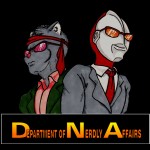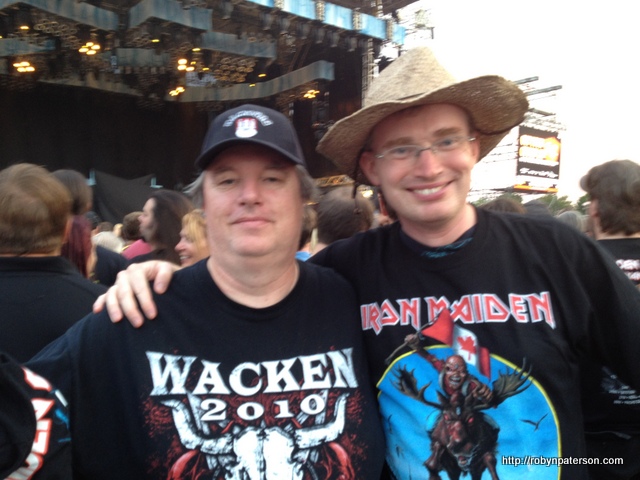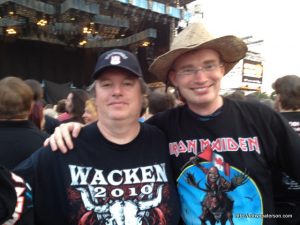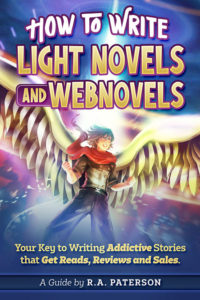
In this episode, Rob and Don are joined by music historian Richard Moule to discuss their mutual love and admiration for the musical art form known as Heavy Metal. The trio trace Metal’s history and inspirations, and talk about how metal became THE nerdly music of choice. All this, and why Death Metal is really redneck music, here for you in this episode of the Department of Nerdly Affairs.
Closing Music: Ode to Joy performed by Oliver Eckelt
Things Discussed:
Black Sabbath
Judas Priest
Transformers the Movie (1986) Soundtrack
Jethro Tull
The Moody Blues
Hammer Horror
Dennis Wheatley
Iron Maiden
Motorhead
Nightwish
Blind Guardian
Opeth
Manowar
Children of Bodom covers Vivaldi
Tri-tone
Algeron Blackwood
Blue Oyster Cult
Blue Oyster Cult in Comics!
331E-Rock
Frog Leap Studios
Global Metal Documentary






I have to say this episode surprised me. I never really considered Heavy Metal to be geek culture. Although the big exception to the rule was my best friend who was absolutely a geek- everyone else I ever knew who loved Heavy Metal was the “head banger” variety- people who partied a lot and only stopped to listened to the lyrics when they were drugged out enough to listen to the one required acoustic song every Heavy Metal band had to prove they were actual musicians. In short, anyone I knew who liked Heavy Metal were effectively Bill and Ted. 🙂
I remember my friend trying to draw me into the music by showing me the lyrics on the album covers. When I realized I could understand half the time what they were singing, I’d be better off just reading the album covers and appreciating the music as ballads, it was so much better.
I’m like Rob in that way. If it wasn’t lyrical or meaningful, it was more than confusing to me.
I think thrash rock is kind of like modern art, you listen to it for how it makes you feel.
And as someone who loves story above all, I just felt that I could do as good a work if I stepped on my cat’s tale, or spent the afternoon cutting down trees with my father’s chainsaw.
The masturbatory power solos that ripped up and down the neck or fluttered a pentatonic scale didn’t particularly impress me either.
Rob asked “What other music…?” and I began head banging against my own desk in frustration. Honestly, folk and folk rock has all the meaningful lyrics from story songs- even mythological ones, with far more singable and memorable tunes.
I glommed on to folk because it was something that well “folks” could sing together and enjoy. I saw Heavy Metal as pretty much what it was meant to be- counter culture. If you are engaged in counter culture, you’re really just interested in creating another culture different from the culture you are used to. It’s all the same thing. So, I never found it really “different”.
Instead of different. I wanted interesting and clever.
So to answer your question. Go look at “Legends of the Lost and Found” live album by Harry Chapin and see the spectrum of ballads he had. And if you want something more mythological, go look at early Chris deBurgh with songs like “Crusader” or “The Tower” (based on the Japanese myth). Or “A Spaceman Came Travelling”. Or for that matter, check out “Spanish Train” for your “Devil Beats God” story songs.
That’s just two performers that come to mind. And none of those tunes need a power system required to light up Prince Edward Island to get the story across.
Sure there’s been the inclusion of heavy metal in some movies. Titan A.E. does it well. Heavy Metal of course, and some harder edged Queen in Highlander comes to mind. Heavy Metal makes great mood music for industrial science fiction. But, other than that and the lyrics that no one really hears, how does it actually fit in geek culture? Wouldn’t Filk be Metal instead of folk if that were the case? Keep on rockin’ in the free verse gentlemen!
>I never really considered Heavy Metal to be geek culture. Although the big exception to the rule was my best friend who was absolutely a geek- everyone else I ever knew who loved Heavy Metal was the “head banger” variety-
In cases like this you have to be really careful of confirmation bias. Most of the gamer types I knew were metal heads, as were most of the classic dirtbag types. But does/did either statistically represent the median metal fan? Tough to say. Even the question of what “metal” is has some issues.
>When I realized I could understand half the time what they were singing, I’d be better off just reading the album covers and appreciating the music as ballads, it was so much better.
Oh, so you’re one of the metal impaired…
>I think thrash rock is kind of like modern art, you listen to it for how it makes you feel.
Most entertainment is like that, although there’s a lot of personal effect as to what makes one feel good. I like a little depth, texture, impact…. lots of folks just like; say for music, a bouncy beat and panderingly inspiring message. I’m not a big thrash fan either, but that’s just one type of metal.
>The masturbatory power solos that ripped up and down the neck or fluttered a pentatonic scale didn’t particularly impress me either.
….that’s hair metal, and I’m not a bug fan either….
>folk and folk rock has all the meaningful lyrics from story songs- even mythological ones, with far more singable and memorable tunes.
Sometimes. Sometimes it’s whiney and gutless and just as subject to excesses (albeit different ones) as the most processed hair metal. (I’m looking at YOU; 1990’s.) But there are a lot of folk/folk rock bands I like too. Klaatu, Prism, Kansas, Loreena McKennitt…. and a lot of their stuff, thematically crosses over with a whole ton of metal genres. Especially the European power metal groups.
>I saw Heavy Metal as pretty much what it was meant to be- counter culture.
But so is folk; especially when you go back to it’s 60’s and 70’s incarnation. At that time it was THE counter culture music, and fuelled a number of ACTUAL revolutions.
>And none of those tunes need a power system required to light up Prince Edward Island to get the story across.
Yeah, but they don’t NOT need to. That’s where the personal taste thing comes in. You can have depth with or without the flash. I think that’s why I don’t buy into the argument a lot of critics make of metal somehow being inherently inferior to other genres. I think a lot of the appreciation comes down to personal preference, which is cool; but huge stage shows, or ripping guitars, or big hair doesn’t denote overall quality, or lack thereof. You might not LIKE it, but that doesn’t mean it’s not as deep or skillful as something that does appeal to you.
It’s like the argument that comes up quite often any more, that superheroes are inherently childish…. which isn’t true at all. You can do a kids superhero feature, or a grownup one, or a dark one, or bright one…. There’s nothing in the core concept that insists on any specific demographic, but the story for a LONG time has been “kids stuff.” And until recently the uninitiated have been perfectly content to adhere to that. Poo poo-ing as crass and vile any production that contradicts the idea.
Like how people who aren’t metal fans think ALL metal is Psychostick: https://www.youtube.com/watch?v=AqSVxpAzl1I and will hold that opinion no matter how many “Nightwish” or “Within Temptation” songs you expose them to.
>other than that and the lyrics that no one really hears, how does it actually fit in geek culture?
Well; “that and the lyrics that no one really hears” is the answer. The core themes have an astounding amount of overlap, especially for the power/melodic/Viking branches of the metal tree. (Which I’ve seen describes as “metal meets opera meets Dungeons and Dragons.”)
>Wouldn’t Filk be Metal instead of folk if that were the case?
Hee heee…. Filk! The big dif is stylistic. Filk is closer to the novelty/parody/folk branches of music; mostly ‘cos it tends to go for comedic effect with the lyrics, and it’s usually meant to be played acoustically and sung by a single person or small group.
But yes again, there’s a lot of overlap. Not surprising, when you consider that filk comes out of the protest song stylings of 60’s and 70’s folk music (especially in the “sing along” aspect) and metal has it’s roots in the 60’s psychedelic scene; and 70’s acid rock scene…. which both came out of the 60’s counterculture boom.
Don C.